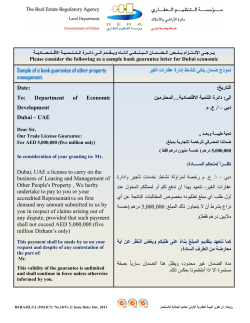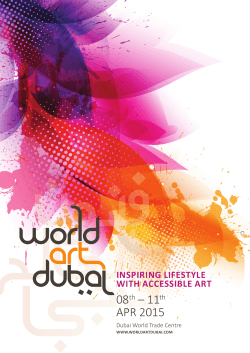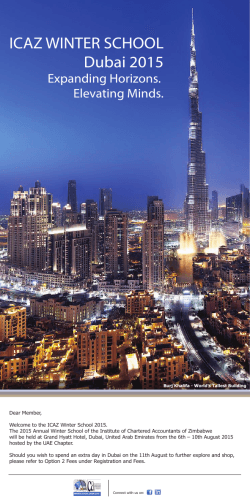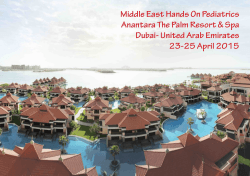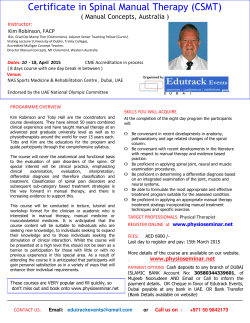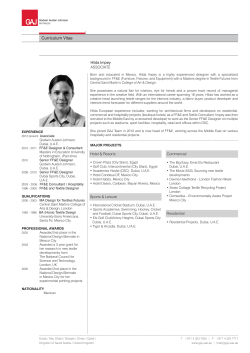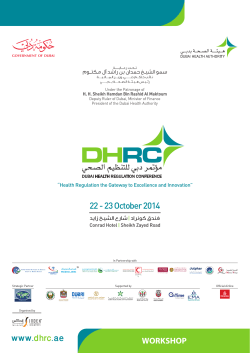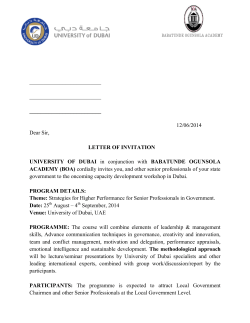
May to August 2014 - World Zarathushti Chamber of Commerce
World Zarathushti Chamber of Commerce May - August, 2014 Newsletter For Private Circulation only Message from the Chairman’s Desk WZCC GLOBAL AGM AND ENTERPRISE DUBAI / BUSINESS CONTEST New Year Resolution WZCC will be holding its Global AGM 2014 in Dubai on Thursday, 18 December 2014. On an auspicious and a festive season WZCC wishes all its Members, a very Happy NAVROZE. This will be followed by an exciting Event – “Enterprise Dubai” to be held in Dubai from Friday, 19 December 2014 to Sunday, 21 December 2014. This Event also includes a Business Contest which will honour the best and brightest Innovators and Entrepreneurs. However, what is more important is the resolve to do something more and more for our Community as the years go by. We need to have a New Year Resolution which ideally should encompass the following in terms of actions. 1. The entire Community needs to remain united on all fronts. Differences of opinion, debate, etc. are certainly acceptable but what is of prime importance is keeping the essence and the name of our Community at its pinnacle for all times to come. 2. Ego and Arrogance should be buried fathoms deep – never to resurface again. Keeping a low profile and remaining modest is not a sign of weakness. 3. Put in practice the ideals of our forefathers in all the fields of our life. Resting on past laurels and simply talking about the unparalleled achievements of our worthy ancestors will not cut ice. 4. Our ‘Youth’ is our invaluable asset. They have to work hard, have a focused career and aim for the best. The attitude of being “in a comfort zone” is a sure way towards a magnificent failure. World is highly competitive – it is “the survival of the fittest”. 5. Our elders in their respective fields need to give guidance to our Youth. The attitude of saying – “I am superior to you” or “I have no time for you” speaks of arrogance, indifference and pompous behavior and selfish desires. If our Youth seek help, we need to give it to them. Let us not ignore our Youth by finding escape routes. Each generation has to pass on its legacy to the next generation. If our ancestors have spent their valuable time, money and energy for the progress of our Community, it is our duty to replicate this for our next generation. 6. Our youth also need to follow the good advice of their worthy elders. The good old time-tested values of life passed on to us by our forefathers just cannot be ignored. In fact, as time goes by, their teachings become more and more important and valuable. 7. Let us sign off and follow the ideals of our ancestors and say we remain, “Yours sincerely”, “Your faithfully” and “Yours obediently”. Adi B. Siganporia Besides the pamphlets published in this Newsletter, further details of these Events are available on the WZCC Website www. wzcc.net and also vide WZCC circular dated 30 April 2014. We hope that all our Members will participate as concessional rate is being offered as a very special case. An early response will be of mutual benefit. Kudos to our Honorary Member - Mr. Sam Balsara Recent Events 10th Anniversary Event - Pune Chapter WZCC at HPY WZCC Emphasizing Ecology Forthcoming Events Enterprise Dubai Business Contest Noteworthy Information Spend Wisely Highlights of the Companies Act 2013 Plastics and the Environment - Part 2 Did you know? Interesting Facts about Indian Railways. 02 03 04 05 06 07 08 09 10 11 KUDOS TO OUR HONORARY MEMBER – MR. SAM BALSARA Mr. Sam Balsara is one of India’s most prominent figures in the world of Media & Advertising. His Company “Madison World” is one of the largest Ad Agency in India. Sam always finds time for Community matters and has been very helpful in making Dubai as well as Mumbai World Zoroastrian Congress a success. Sam and his team handled the triumphant advertising campaign of BJP in the last Indian Elections held recently. It has been proven again that mass media has the power to move mountains. Reproduced below is his interview by Pritha Mitra Dasgupta of the Economic Times Bureau Sam Balsara, CMD, Madison World spoke to ET about ‘the toughest campaign of his career’. Edited excerpts: How did the BJP mandate come to Madison? We were first contacted by Prashant Kishore in Ahmedabad through our client Lodha. Subsequently we were contacted by Ajay Singh and Arun Narendranath. Then we met Piyush Goyal and Arun Jaitley. All major agencies were competing for the account. What won us the business was a lot of detail work revolving around media reach in different constituencies. Political parties like the BJP and RSS were known to be orthodox, not open to modern ideas. Was that a problem? We were confident of delivering on our product not just because of faith in our own experience, expertise and capability but we knew we had a strong product, compared to competition. Advertising works brilliantly for a good product, but kills a bad product fast. The party did a number of innovations, like the content integration with Channel V. Was BJP open to these ideas from the beginning? Yes. That was the very reason they reached out to professionals and then played a supportive role, not an interfering role. I must say the people at BJP are not the stereotypical politicians; they are smart, savvy and intelligent managers who have left corporate jobs to help the nation catch up on lost time. Reaching out to media-dark markets like UP & Bihar seemed to be a big challenge. 02 May - August, 2014 - Newsletter How did you resolve that? These markets did pose a challenge and obviously got greater share of our attention. In addition to mass media these markets got intensive below-the-line support. What were some of the biggest challenges you faced? Outdoor -- in UP especially -- posed huge challenges because of unfair play by the ruling party in granting permissions for putting up hoardings. The other challenge was negotiations with media, some of whom artificially inflated their rates for political campaigns! Random numbers floating around in the media for the budget of our campaign made our task more difficult. Would you call this the toughest campaign of your career? What made it tougher was frequent changes based on feedback from state units. Work timings for the team changed from 9 am to 5 pm to 12 noon to 3 am. We succeeded in releasing jackets in newspapers at 4 hours notice, and TV spots at 2 hours notice. Going forward, will you continue to work for BJP or the new government? We hope so. What I would really like is for the Government of India to appoint us as media advisors. We could make a huge difference in terms of efficiency and effectiveness. Communication is a very important element in the nation building process. People say BJP spent close to Rs 5,000 crore for the election ad campaign. Is that true? That is indeed the finest compliment that Madison Media has ever received. The actual spend is a minuscule fraction of that number, but I am not at liberty to reveal it. The BJP campaign has once again proven that mass media has the power to move mountains, it is not as expensive as it is thought to be and multi- media is essential for effectiveness. What our campaign achieved is that it cost-effectivity raised the pitch to a crescendo, constituency by constituency as polling day neared which converted a communication task into what you in media call a Modi “wave” that resulted in a landslide victory for the BJP. Recent Events Pune Chapter Celebrates its 10th Anniversary Event - Saturday, 5 July 2014 The day of celebration started with a Youth Training Programme at Extensia (owned by Pune member, Umeed Kothavala). The programme focused on ‘Effective Communication in the Professional Environment’, and was conducted by Parsi Times Editor Freyan Bhathena and Khurshid Irani. It was attended and well received by over 50 young adults! The WZCC Pune Chapter members along with their fellow WZCC Mumbai members and other well wishers, dressed in all their finery for the evening event that was held at the Taj Vivanta. A special programme which included a host of Awards and Special mentions was followed up by a lavish dinner. WZCC Pune Chapter Chairman, Viraf Deboo welcomed the guests. This was followed by Expressions of Gratitude made to the Youth ZProgram Trainers. Adi Engineer, the past Chair of WZCC, Pune was felicitated for his years of service. Global President, Minoo Shroff addressed the crowd followed by a panel discussion on “The Indian Economy – Outlook, Possibilities, Global Role & Impact”. It was an engaging session with several points of view raised by the participants, with inputs from the moderator, Extentia’s CEO Umeed Kothavala as well. It was generally agreed upon that the outlook for the Indian economy seemed positive, spurred by recent political change. Jansher Banaji added some music to the evening with his Classical Piano set just before the Award Ceremony began. Zervaan Phiroze Suratia, a professional race jockey was bestowed with the Special Achievement Award alongside Restauranteur, Khodadad Irani of High Spirits and Olive Bistro, Pune fame. Firoza Adil Bharucha, Pune’s celebrated Speech and Drama Teacher won the award for the Outstanding Woman Entrepreneur/ Professional. Porusasp Rustam Dadachanji, the Technical Director of KAM-AVDA was given the Outstanding Entrepreneur/ Profession award. Rati Forbes did the honours fo the ceremonial cake cutting right after the Awards and Farhad Forbes, the Guest of Honour later addressed the crowd. Mr. Farhad Forbes Chief Guest Last but not the least, Khushru Minocherhomji gave a Vote of Thanks and the guests proceeded towards the lavish dinner and some fancy cocktails. To say that the evening was a memorable one is an understatement. WZCC Pune in ten years have many great achievements to their credit. We wish them success for all that follows ! May - August, 2014 - Newsletter 03 Recent Events WZCC at Holiday Program For The Youth (HPY) World Zarathushti Chamber of Commerce (WZCC) along with the organizers of Holiday Program for Youth arranged an interesting event for the Parsi youth attending the “HPY” held at Byramjee Jeejeebhoy Parsi Charitable Institution (BJPCI, Mumbai) on Monday, 19 May 2014. The Program started with the introduction of WZCC and was followed by a short movie “One Idiot” – a movie on financial literacy for the kids. The Event essentially involved learning with fun the nitty gritty of how a business is done. The youth were introduced to a game, “Drink Game” where four teams were given raw material to make a finished product. This product was then promoted by the participants vide a marketing campaign which included coining of jingles, skits, TV advertisements and then sold. The four teams tried to sell their product in the market with different scenario, price strategy and marketing strategy, which was indeed a sight to watch. The extent of enthusiasm were seen to be believed. The entire group of youngsters of our Community were participating with tremendous sense of zeal and success. 04 May - August, 2014 - Newsletter This was just a first step for them to understand the basic principles of Management, marketing strategies and sense of co-ordination in whatever they do. WZCC Committee members, particularly, Mr. Murad Currawalla and Mr. Maher Dhamodiwala, Ms Zarine Khan and Mr. Aspi Antia, made tremendous efforts to ensure that the Event became successful coupled with some amount of fun. The winning team - “ENACTORS” – were given a nominal prize in appreciation of their efforts by Mr. Adi Siganporia, Chairman-Mumbai Chapter. WZCC Rotating Trophy was given to the winning team at the valedictory function held on Sunday, 1 June 2014 at the BJPCI. The Program, which was almost for a full day, encouraged the youngsters to have and inculcate a sense of Entrepreneurship. WZCC and the HPY organizers were indeed very happy to conduct this event jointly for the good of our younger generation. Recent Events WZCC Emphasizing Ecology (Interesting Talk by Prof. Soli Jal Arceivala) WZCC Mumbai Chapter organized for its members a Program on “Renewable Energy and other Green Technologies” on Monday July 28, 2014 at Bombay YMCA, Colaba. This program was a unique business opportunity and a learning experience for all the entrepreneurs and professionals. The program stressed the importance of how best we can economize on the use of fossil fuel and see how we can use the renewable sources of power at our command, such as, hydro, solar, wind, biomass, wave and geothermal to meet our needs. The field of Green technology is expected to bring innovation and changes in daily life and which will be similar in magnitude to the “Information Technology” explosion over the last two decades. In the present day context, Renewable Energy and Green Technology are also viewed as a big business opportunity. The talk on this subject began at 6:30pm by Prof. Soli J. Arceivala, Environmental Engineer, from Harvard University USA who also introduced a post-graduate course on Environmental Engineering in 1959 at VJTI, Bombay University. He is also the first person in India to establish a Consultancy Company specializing in water and environmental engineering work as far back as 1961, long before any legislations for pollution control existed. He was invited to join the UN/WHO as Regional Advisor, first with the European Region for 10 years and then as Chief of Environmental Health, South East Asia for 16 years. The talk also indicated the direction in which business and technology are likely to develop in the future. Prof. Soli J. Arceivala in his speech emphasized that the cities need more management and the villages need more development. While explaining the green technology, he said, “Gujarat and Tamil Nadu can already boast of several privately owned solar and wind installations, respectively, which feed their surplus electricity into the local electric grids and reduce need for load-shedding in these two States. With 100 new towns being planned as also the Delhi-Mumbai Industrial corridor coming up, good management of resources and an enhanced business sentiment is what we will need most.” He further said, “With our large population we also need more mass transport systems and many more green buildings and “green” infrastructure for water, waste water and solid wastes.” He also mentioned that enough people have not yet been made to switch over to CFL or LED bulbs instead of old incandescent ones for households, advertisement billboards and outdoor functions. People have not yet been pushed to install solar water heaters for hotels, hostels, clubs and other large users. Many other lifestyle changes are yet to take place in the cities so that sustainability becomes the key to our activities. One of the members, Mehli Batliboi, MD of PC Print Control Pvt. Ltd said, “The talk by Prof. Arceivala was a very eye opening talk on renewable energy. I do hope our country with its humongous resources is able to tap into these new forms of energy and generate electricity while the sun shines.” He also said that these frequent sessions conducted by WZCC give us an opportunity to meet new people and professionals from different fields. The floor was then opened for questions and answers. Mr. P. P. Kharas, Director - International Board, WZCC expressed his gratitude to Prof. Arceivala for enlightening the audience on the key aspects of renewable energy. Mr. Minoo R. Shroff, Global President - WZCC, presented a memento to Prof. Arceivala, as a token of appreciation on behalf of the WZCC and the program concluded with a networking session while tasting the sumptuous dinner. May - August, 2014 - Newsletter 05 19th - 21st December, 2014 Crowne Plaza Hotel, Shaikh Zayed Road, Dubai “Connecting the Leaders of Today with Tomorrow” A mega event filled with multiple opportunities, wonderful sightseeing, lots of entertainment and roaring fun. Once in a life time event for Zoroastrian community; especially for our youth. Don’t miss this event. Be there! Special Offer (Up to 31st May, 2014) Adults 775/- (US$ 215) (Two days) AED 925/- (US$ 255) (Three days) AED *** Children 4 - 12 Years AED 475/- AED 650/- (US$ 130) (Two days) (US$ 180) (Three days) (Includes free entry to all sessions, Breakfasts, Teas, Coffees, lunches, dinners, sightseeing and entertainment programs) New Rates effective 1st June, 2014 EVENT HIGHLIGHTS ë Majestic opening with Festival of Lights, Sound and Sand art ë Meet the Royalty and world renowned speakers and network with global diaspora ë Explore business opportunities that Dubai as World Expo city 2020 will offer ë Exchange ideas for setting up offices in Dubai/UAE and hold B2B Meetings ë Talk to Recruitment companies if you are looking out for a job in Dubai Adults 815/- (US$ 225) (Two days) AED 970/- (US$ 270) (Three days) *** Children 4 - 12 Years AED 500/- (US$ 135) (Two days) AED 680/- (US$ 190) (Three days) Participate in various Competitions and win Bumper Prizes: AED For Hotel Booking Contact: Crowne Plaza, Shaikh Zayed Road, Dubai Hotel Front Desk Tel: +971-4-3311111 Aed.325/- (per day) - Single/Double occupancy (2 Adults + 2 Kids) Aed.780/- (per day) - One Bedroom Apt. (3 Adults + 2 Kids) Aed.1400/- (per day) - Two Bedroom Apt. (4 Adults + 2 Kids) (Registration mandatory before Hotel Booking) Contact Details: • Masters of the Home Kitchen – Prize money Rs. 50,000/ & Consolation Prizes • Who wants to be a Millionaire – All cash prizes • Cricket Quiz hosted by renowned wicket keeper Farokh Engineer & mega gifts Delicious Food, Glittering Fashion Show, Comedy Play and much more… ë Gala Awards ceremony - Zoroastrian Ratna Awards & Legendary Service Awards ë Exhibition on trade and culture ë One full day Sightseeing (Burj Khalifa, Gold souk, Abra water taxi ride, www.wzcongress.org/enterprisedubai/ +971 50 5505174 Business Contest – Prize Money Rs. 7,00,000/- ë Dubai Museum, Burj Al Arab, Atlantis, The Palm and Dhow Cruise) Email: [email protected] Tel: +971 50 4590258 | +971 50 5158659 • ë Desert Safari or visit the Global Village (at nominal cost) Event Organized by: WZCongress, Dubai Shop till you drop at the DUBAI GOLD SOUK Relax and enjoy the Exotic Enjoy the DESERT SAFARI DHOW CRUISE Have fun at the GLOBAL VILLAGE 19th -21st Dec, 2014 Enterprise Dubai presents BUSINESS CONTEST IDEA, INNOVATE & IMPLEMENT A business competition that honors the best and brightest innovators and entrepreneurs. So turn your ideas into business and participate now. ney Mo Prize First Prize - Aed 30,000/- (US$ 8,000/- or Rs. 5,00,000/-) Second Prize - Aed 12,000/- (US$ 3,000/- or Rs. 2,00,000/-) Rules of the Contest: • Competition open to individuals or teams not exceeding 3 persons with new ideas for starting a business. • Competition is also open to existing company Owners/Partners with new ideas for starting a new product line or service. • Minimum age of the applicant should be 18 years. • The idea can be in any sector. No industry will be favored over any other. All businesses must be for profit. • All applications must be the original work of those making the submission. The idea should be new/innovative. • The application should be sent latest by 31st July 2014 to [email protected] • Four finalists from a total of 30 applicants (first-come, first-served basis) will be selected to make a presentation in person at the event in Dubai. • A panel of world renowned CEOs/Entrepreneurs/Financial Experts will judge the competition on 19th December 2014 at the Crowne Plaza Hotel, Dubai • Two winners will be selected and prizes will be offered in cash to the first and second winner. Enterprise Dubai is a mega event taking place at the Crowne Plaza Hotel, Sheikh Zayed Road, Dubai from 19th to 21st December, 2014 For more details visit: www.wzcongress.org/enterprisedubai/ For queries write to: [email protected] Noteworthy Information This New Year – spend wisely There is a famous saying on shopping by Bill Bryson that “We used to build civilizations. Now we build shopping malls”. This pretty much sums up the change in the shopping mindset in the last decade. Today most of us are buying based on a want or a desire rather than an actual need. As rightly said by someone-Shopping-The fine art of acquiring things you don’t need with money you don’t have. Steps for smart buying Thus with this article we aim at educating you about smart shopping and how to control the impulse to spend, since it is not your salary that makes you rich, it’s your spending habits that does so well. Hope u enjoy reading this article and try to shop wisely the next time… Step 2 - Delay a while Don’t buy on the same day when you have finalised the items in any store. Postpone the action for a couple of days. Check for offers in other stores also. In case of discount offers, go shopping 2-3 days prior the offer ends. How have we changed in terms of spending habits? Step 3 - Research online Remember to do any online research of the item you have finalised. Today many sites offer information as well as reviews of all types of products. Take such opinions into consideration before you make a final decision. I remember in our childhood we used to shop for clothes and accessories during the festive season. Shopping was an event looked forward to at that time. The things bought were also limited in variety as compared to what we are buying today. Now there is a craze for rushing to the shopping malls armed with credit cards whenever you are free. And the result is we end up buying things that we can do without The odds of going to the store for a loaf of bread and coming out with only a loaf of bread are three billion to one. ~ Erma Bombeck There are many of us who believe that they will feel better if they shop! This is what we call as impulse or emotional buying which forms a major part of our spending today. Thus rises a new addiction “Shopoholism”. Step 1 - Check need vs want Categorize your needs and wants. Once this is done, focus on your needs. Buy things that are absolutely necessary. Wants can wait. A bargain ain’t a bargain unless it’s something you need. ~Sidney Carroll Step 4 - Best Deals Check for offers or discount from retail stores as well as online shops before arriving at a decision to buy. Generally there as sales at the time of festive season, get information about the same and wait for the same if possible. Step 5 - Bills and Warranty Ensure at all times that your bill and warranty card is dated and stamped. Keep them at a safe place for future reference. As rightly said by Joyce Brothers ~ ”Credit buying is much like being drunk. The buzz happens immediately and gives u a lift …The hangover comes the day after. Step 6 - Return / Replace policy Try to buy from shops that support return /replace policy even if the product is a bit costlier. Do not immediately remove the labels. You thus have an option to return the product in case you don’t like after careful consideration and ask for a refund or replacement. Techniques to curb spending No Impulse Buying There is a popular saying by Benjamin Franklin-”A penny saved is a penny earned.” To get a control over your spending, there is a dire need to control your emotions. At times we get overexcited looking at discount offers and tend to buy things which were never on our shopping list. Thus once we are in control of our emotions, we can curb our spending habits. Let me list a few techniques that can curb emotional spending by you- There are certain things that should never be bought on impulse or emotions. Things having long term effects namely house property, car, home renovations etc should be bought after careful consideration. Not spending=Savings=Greater Wealth Stay away from shopping malls, avoid meetings, get togethers there. Instead you could go to a café for meetings or get togethers. A golden rulePay for online shopping using cash or debit card. Always make a list prior to going shopping. Let the kids also include his needs in the list. Shop as per your list .This avoids unwanted shopping both by you as well as your kids. Avoid going shopping in a group. Going shopping with people better off than you can lead to purchasing stuff which are more expensive and not needed by you but purchased just to show off/compete. Don’t compare what your relatives or friends have and what you don’t have. Each individual has different needs and wants. Keep a limited monthly budget for impulse spending and follow it strictly. 08 May - August, 2014 - Newsletter There is a famous Jamaican Proverb ~ ”Save money and money will save you”. Thus by spending wisely and not on impulses, you can easily save 5-15% of your yearly expenses. This amount can be used for savings and investment for a better future. A spending cut of just Rs 500 monthly when put in mutual fund SIP can potentially give you Rs 1.31 lacs in 10 yrs @ 15% returns. A good financial plan can guarantee greater wealth, peaceful retirement, quality holidays and better standard of living. “Spending on impulse is common among younger generation. Teach them the value of savings. You must learn to save first and spend afterwards” ~ John Poole. “Do not save what is left after spending, but spend what is left after saving”. ~ Warren Buffet Article contributed by Maher Dhamodiwala and NJ publication. Maher Dhamodiwala runs Financial Artists, a Financial planning Firm. You can reach him at: [email protected]. He is also a Committee Member of the WZCC Mumbai Chapter. Noteworthy Information Highlights of the Companies Act 2013 With the implementation of the New Companies Act 2013 (the “Act”), there are a whole list of requirements and new provisions for Companies to comply with. The following paragraph highlights the extremely key points to note that the new act has brought up. 1. Mention of CIN: Every company shall get its name, address of its Registered Office and the Corporate Identity Number (CIN) along with telephone number, fax number, if any, e-mail and website addresses, if any, printed in all its business letters, billheads, letter papers and in all its notices and other official publications The company and every officer who is in default shall be liable to a penalty of one thousand rupees for every day during which the default continues but not exceeding one lakh rupees. 2. One Person Company (OPC): It’s a Private Company having only one Member and at least One Director. No compulsion to hold AGM. Conversion of existing private Companies with paid-up capital up to Rs 50 Lacs and turnover up to Rs 2 Crores into OPC is also permitted. 3. Women Director: Every Listed Company /Public Company with paid up capital of Rs 100 Crores or more / Public Company with turnover of Rs 300 Crores or more shall have at least one Woman Director on its board. 4. Resident Director: Every Company must have a director who stayed in India for a totalperiod of 182 days or more in previous calendar year. That is, at least one director of a company must be a resident in India during the relevant period. 5. Accounting Year: Every company shall follow uniform accounting year i.e. 1st April -31st March. For companies who need to report a consolidated financials, certain provisions have been prescribed for their benefits. Moreover, those companies which follow a different financial year have to align their accounting year to 1st April to 31st March within 2 years. It is desirable to do the same as early as possible since most the compliances are on financial year basis under the new Companies Act. 6. Loans to director: The Company cannot advance any kind of loan / guarantee / security to any director, Director of holding company, his partner, his relative, Firm in which he or his relative is partner, private limited in which he is director or member or any bodies corporate whose 25% or more of total voting power or board of Directors is controlled by him. 7. Loans from Relatives: Unlike the Earlier Act, where private limited companies were permitted to borrow from directors, shareholders and relatives, the New Act had brought about a major change in these provisions since going forward, a private company can only now borrow from directors apart from banks and financial institutions and not from relatives of directors. Furthermore, the director needs to make a declaration that the amount that he is giving is not out of borrowed funds. The borrowed amount cannot exceed the share capital plus free reserves without consent by means of a special resolution. This however does not apply for short term loans (repayable on demand or within 6 months). 8. Corporate Social Responsibility (CSR): The Act requires that companies set up a CSR board committee, which must consist of at least three directors, one of whom must be independent and the committee must ensure that the company spends “at least 2 percent of the average net profits of the company made during the three immediately preceding financial years” on “CSR” activities. Prior to each annual meeting, the board must submit a report that includes details about the CSR initiatives undertaken during the previous financial year. If the company fails to spend this amount on CSR, the board must disclose why in its annual report. The Act defines CSR as activities that promote poverty reduction, education, health, environmental sustainability, gender equality, and vocational skills development. This Applies to any company that is incorporated in India, whether it is domestic or a subsidiary of a foreign company, and which has (1) net worth of Rs. 5 billion or more, (2) turnover of Rs. 10 billion or more, or (3) net profit of Rs. 50 million or more during any of the previous three financial years. 9. Mention of DIN: Every person or company, while furnishing any return, information or particulars as are required to be furnished under the Companies Act 2013, shall mention the Director Identification Number (DIN) in such return, information or particulars in case such return, information or particulars relate to the director or contain any reference of any director. In case of default, such director of the company shall be punishable with imprisonment for a term which may extend to six months or with fine which may extend to fifty thousand rupees and where the contravention is a continuing one, with a further fine which may extend to five hundred rupees for every day after the first during which the contravention continues. 10.Miscellaneous Provisions: ● Shares cannot be issued at a discount except sweat equity shares. ● Time gap between two buy backs shall be a minimum of 1 year ● Maximum number of members in a Private Limited Company would be increased from 50 to 200. ● Minimum 4 board meetings are required to be held in a year. The gap between two board meetings cannot exceed 120 days. ● Prescribed hardbound register to maintain Statutory Register and Minutes book. The above points are simply a brief overview of a few keys highlights of the changes under the New Act. We recommend that the specifics of each point be examined in depth for a clear understanding. Article contributed by Mr Xerxes V Dastur, Partner – V. S. Dastur & Co., Chartered Accountants. He is also the Vice Chairman & Hon. Treasurer of WZCC-Mumbai Chapter May - August, 2014 - Newsletter 09 Noteworthy Information PLASTICS AND THE ENVIRONMENT - PART 2 Part - 1 of this 3 part series appeared in WZCC’s January to April 2014 Newsletter. Part – 1 covered the manner or process (“Life Cycle Analysis” – LCA) by which plastics, and other conventional materials, used in different packaging applications, at comparable performance levels, are evaluated to determine the impact on the environment in terms of : ● ● ● ● the use of the world’s non renewable resources the energy input the pollution discharged to land, water and atmosphere the disposal or recycling and recovery of a significant part of the inherent energy The two LCA studies in Part-1 showed that plastic packaging imposes a significantly lower burden on the environment and hence contributes to what is termed – “sustainable development”. Sustainability is defined as “development which meets the needs of the people without compromising the ability of future generations to meet their own needs”. What this definition implies is : that there has to be synergy between development, social equity and the environment; this would not have been possible without the use of plastics in a wide range of applications. Just two of the several applications of plastics, covered in this Article, demonstrate the environmental and sustainable benefits of plastics. Automobile Industry An example of the environmental benefits of plastics is its use in the Automobile industry. A typical passenger car’s plastic content is 8% to 11% of the vehicle weight. It is estimated that, on an average 100 kgs of plastics replaces 200-300 kgs of conventional materials. A 10% reduction in vehicle weight results in 5% to 7% fuel savings, reducing the fuel consumption by 750 litres over the life-span of 150,000 kms running of a car. Globally this could amount to a saving of over 21 million barrels per year over the average lifetime of cars. Additional calculations suggest that it reduces CO2 emissions by 50 million tonnes per year. In some metal replacement applications the weight saving is significant: a fuel tank in high density polyethylene represents weight savings of 40%; battery boxes represent a savings of around 70%. Plastics offer other advantages to the Auto Industry, namely, the unlimited shaping potential and aesthetic appearance of components to provide various aerodynamic shapes, integrated with the functional requirements. The traditional sheet steel used required corrosion protection; plastics are not affected by acid rain, sea spray and road salt. Plastics in Agriculture Plastics in agriculture have a significant role in conserving water and land resources, while providing higher crop yields. Applications of plastics in various branches of agriculture is called “Plasticulture”. Mulching with plastic films is one of the major applications. Mostly black 10 May - August, 2014 - Newsletter film is laid on the soil in rows surrounding the root zone of the plant. ● ● ● ● It prevents weeds from growing and competing for fertiliser. It cuts water evaporation and makes fertilisers more effective. It helps reduce soil erosion. It improves crop yields with more efficient use of resources. Studies have shown that 50% irrigation water can be saved by adopting alternate furrow method irrigation, along with plastic mulch. Sorghum yield increased by 8%, with 28% savings in water. There are any number of studies available on a range of crops and horticulture. The principle of “Drip Irrigation” is based on supplying filter water into or onto the soil. Water is carried by an extensive plastic pipe network with lateral lines of 12mm in diameter with “emitters” that feed water to each plant. The water drips at a constant low discharge to keep the soil moist at the optimum level. The major advantages are : ● ● ● ● Efficient use of water resources by cutting down seepage and evaporation losses Prevents soil erosion More efficient use of fertiliser and nutrients Significant reduction in weed growth Other popular application for films are : greenhouses and nursery bags. In the book titled: “Plastics for Environment & Sustainable Development”, two of the country’s leading scientists, namely, Prof. M.M. Sharma (F.R.S.) and Dr. R.A. Mashelkar (F.R.S.) in the Forward to the book have written that: “Plastics have moulded the modern world and transformed the quality of life. There is no human activity where plastics do not play a key role, from clothing to shelter, from transportation to communication and from entertainment to health care. We truly live in a “Plastic Age”. Our daily lives would be very much poorer without these benign and environmentally friendly materials. Plastics possess a unique combination of properties. Plastics can be super tough, rigid as well as flexible, transparent as well as opaque and can allow selective permeation or act as a barrier material.” Ref: Research studies/reports, sponsored by the Indian Centre for Plastics in Environment; website: www.icpenviro.org P. P. Kharas Director, International Board, WZCC P. P. Kharas was nominated as the first Chairman of Plastindia Foundation’s Enviroplast Committee in 1995. He is a Member of the Executive Committee of the Indian Centre for Plastics in environment. He was earlier President of the Organization of Plastics Processors of India. He was one of the promoter-Director of Ecoplast Ltd. He retired as MD and Chairman in 2007 and is currently the non-Executive Chairman of the Board – Ecoplast Ltd. Did you know? First / Longest / Oldest in Indian Railways ● First passenger train ran on16th April 1853 (between Bombay to Thane) ● First railway bridge - Dapoorie Viaduct on the Mumbai-Thane route ● First Rail Tunnel - Parsik Tunnel ● First Ghats covered by the Rail lines - Thal and Bhore Ghats ● First Underground Railway - Calcutta METRO ● First Computerized Reservation System started in New Delhi (1986) ● First Electric Train ran on 3rd Feb. 1925 (between Bombay VT and Kurla) ● Toilets on Trains were introduced in 1891 (1st Class) & 1907 (lower classes) ● Shortest Station Name - Ib (Orissa) ● Longest Station Name - Sri Venkatanarsimharajuvariapeta (Tamil Nadu) ● Busiest Railway Station - Lucknow (64 trains every day) ● Longest Run (Time) - Vivek Express (3715 km in Approx. 71 hrs) ● Shortest run route between Nagpur to Ajni (3 km) ● Longest Run for Daily Train - Kerala Express (3054 kms in 42.5 hrs) ● Longest Non-Stop Run (Distance) - Trivandrum Rajdhani (528 km in 6.5 hrs) ● Longest Railway Platform in the World - Kharagpur (2,733 ft. in length) ● Longest Railway Bridge - Nehru Setu on Sone River (10044 ft. in length) ● Longest Tunnel - Karbude on Konkan Railway between Monkey Hill & Khandala (6.5 km) ● Oldest Preserved Locomotive, Fairy Queen (1855), still in working order ● Indian Railway’s Fastest Train, Bhopal-Shatabdi (runs at a speed up to 140 Km/ph) ● Train with Maximum Number of Halts - Howrah-Amritsar (Express (115 halts) With Best Complements to WZCC From a Well Wisher May - August, 2014 - Newsletter 11 Tel.: +91 - 22 - 2353 2522 / +91 - 22 - 329 68175 Email: [email protected] www.wzcc.org Join us on Facebook : www.facebook.com/groups/ 8, R.N. Gamadia Polyclinic, Gamadia Colony, Tardeo, Mumba-400 007.
© Copyright 2026
